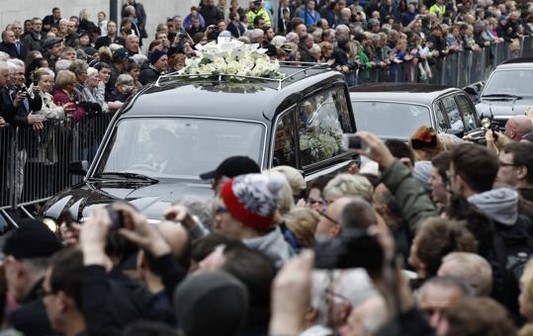LONDON (AP) — Jimmy Savile was one of Britain’s biggest stars — and, allegedly, one of its worst sexual predators. Now the nation is asking whether there was a link between one and the other.

Was this man at the heart of the nation’s popular culture a product of the permissive 1960s and ‘70s, or do the conditions that allegedly let him get away with repeated child sex abuse still exist, even as awareness of the problem is more widespread?
‘‘We’re kidding ourselves if we think it is all hunky dory now, but obviously it was more lax,’’ said Sarah Nelson, a child abuse expert at Edinburgh University. ‘‘The culture among disc jockeys at the time allowed a license you wouldn’t get now.’’
Savile, who died a year ago at age 84, came to fame in an era of social transformation. He started out as a dance hall DJ in the early days of rock ‘n’ roll before breaking into television in the early ‘60s as host of the music program ‘‘Top of the Pops.’’ Later he hosted ‘‘Jim’ll Fix It,’’ a TV show in which he made young viewers’ wishes come true.
The rules of social and sexual behavior in Britain were changing in the ‘60s and ‘70s — and along with new freedoms came opportunities for abuse. Savile’s career in the exploding world of popular entertainment gave him access to legions of star-struck young people.
‘‘It was all opening up — the pop stars, the glamour — and he was able to take advantage of it because of course he became famous and he could introduce them to famous people, get them on ‘Top of the Pops’ and all that,’’ said Max Clifford, Britain’s best-known celebrity publicist.
Savile was further shielded from scrutiny by the notion that celebrities are larger-than-life figures who exist outside normal social constraints. With his brightly colored tracksuits, big cigars and aggressively jocular screen persona he appeared, to many, a harmless oddball — one in a long roster of British eccentrics.
‘‘The public made Jimmy Savile. It loved him. It knighted him,’’ argued writer Andrew O’Hagan in the London Review of Books.
‘‘A whole entertainment structure was built to house him and make him feel secure. That’s no one’s fault: Entertainment, like literature, thrives on weirdoes, and Savile entered a culture made not only to tolerate his oddness but to find it refreshing.’’
Savile’s celebrity became a shield. So did his charity work, which brought him into contact with young people who were vulnerable — students at a school for troubled girls, patients at a psychiatric hospital and a spinal injuries unit.
‘‘He had a lot of power and influence, which is something you find with a lot of pedophiles who get away with it for a long time,’’ Nelson said.
And, she added, ‘‘he was manipulative — picking victims that either would not be believed or were discredited or were physically disabled and literally could not get away from him.’’
Since allegations about Savile were broadcast in a TV documentary in early October, scores of women have come forward to allege that as underage girls they were abused by the late entertainer — in his Rolls-Royce, in BBC dressing rooms, in the schools and hospitals he visited. Police say they have identified 300 potential victims of Savile and associates stretching back almost half a century.
Savile’s behavior had spawned whispers and speculation. One former member of the BBC’s board of governors said by the late 1990s Savile was regarded as a ‘‘creepy sort of character’’ and barred from the broadcaster’s Children in Need charity telethons. But his behavior was never formally investigated by the BBC.
Youngsters made several complaints to police over the years, none of which led to charges. The chief of London’s Metropolitan Police, Bernard Hogan-Howe, has apologized, saying police failed to piece together Savile’s ‘‘pattern of behavior’’ from the disparate complaints.
British police vow that the Savile case will be a watershed moment in combating child abuse, and child protection authorities have stressed that awareness has increased enormously in recent years.
Scandals within several large institutions — from the Roman Catholic Church to the Scouts — have led to soul-searching and stronger rules to protect children, such as criminal record checks on those who work with young people.
Social attitudes have changed, too. Some of the sexualized depictions of young people produced 30 or 40 years ago make uncomfortable viewing now — think of the child prostitutes played by the preteen Brooke Shields in ‘‘Pretty Baby’’ and Jodie Foster in ‘‘Taxi Driver.’’
But in popular culture, children and teenagers continue to be sexualized. Famous teens and their private lives remain tabloid fodder.
Among the British celebrities who received damages from Rupert Murdoch’s now-defunct News of the World tabloid in the phone hacking scandal was singer Charlotte Church, who told a public inquiry that newspapers ran stories about her private affairs and sex life from the time she turned 16. Even earlier, one website set up a ‘‘countdown clock’’ to count the days and hours until she would reach the age of consent.
‘‘That sense that we have sexualized youth is a much broader phenomenon than Jimmy Savile,’’ said David Wilson, professor of criminology at Birmingham City University. ‘‘Why are there padded bras for 13-year-olds? Why are there pressures on boys to have six packs?
‘‘We have taken comfort in the idea that we can blame him.’’
Child welfare groups hope the belated revelation of Savile’s crimes will be a catalyst, encouraging more victims to report their abusers. The National Society for the Prevention of Cruelty to Children says the scandal has triggered a surge in reports of abuse — both from the past and from the present.
But, say some, authorities still too often fail to listen to youngsters who report abuse.
Nelson, the child abuse expert, said the danger was that the Savile case ‘‘creates a storm for a few weeks’’ but changes little.
‘‘In Britain, the child protection system is very bureaucratic,’’ she said. ‘‘It relies on children to tell — and most children don’t tell. It relies on a criminal justice system that can be very aggressive to victims.
‘‘It shouldn’t take something like this to make people able to come forward to say this has happened to me, or this has happened in my family.’’





